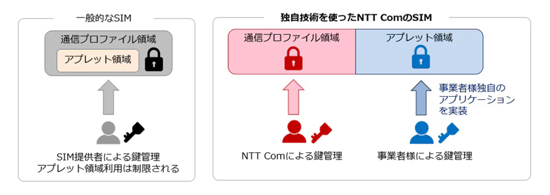Creating use cases that utilize the SIM applet area NTT Communications

NTT Communications (NTT Com) has developed ” applet area division technology” that allows the applet area in the SIM to be used freely, and is working on creating use cases.
SIM, which is essential for telephone and data communications, is called a small computer and is equipped with CPU, memory, and OS. SIM, which is a type of IC card, also has high security performance. It has excellent tamper resistance, making it extremely difficult for unauthorized external parties to access or tamper with information. Additionally, the chip’s circuitry will be destroyed if the package is physically opened.
The inside of the SIM can be roughly divided into a communication profile area and an applet area. A communication profile is an area used for communication. The applet area is an area where information other than communications can be written.
General SIMs are managed by SIM providers such as telecommunications carriers, and the applet area is not released. On the other hand, applet area division technology makes it possible to completely separate and manage communication profiles and applet areas. The communication profile area, which cannot be disclosed, will be managed by NTT Com, but the applet area can be used freely by users (such as IoT operators). For example, it is possible to implement your own program.
By utilizing the applet area, IoT businesses can add new added value to SIMs, promoting the creation of new business models.
IT Access, which operates vending machines, has adopted a SIM based on applet area division technology in its cloud-based payment terminal that will go on sale in April. Through this SIM, we aim to reduce the cost of security measures for payment terminals and expand the spread of cashless payments.
A cloud-based payment terminal is a terminal whose payment processing and security mechanisms are placed on a dedicated server and accessed via network to process payments.
IT Access operates 120,000 cloud-based payment terminals, mainly vending machines.
Normally, payment terminals have a robust storage area for storing and processing sensitive information, but developing this area is costly and has been a barrier to business development. By utilizing the applet area, it is possible to process sensitive information with the same security level as when sensitive information is processed in the storage area within the terminal. The storage area that was originally required to be provided in the payment terminal itself is no longer required, and the manufacturing cost of the payment terminal can be reduced.
